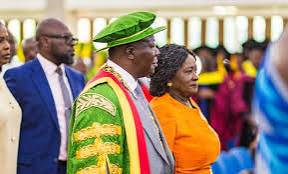“We Promise Not to Interfere”: But Can Public Universities in Ghana Really Breathe Freely?
— Why the Vice-President’s reassurance sounds good on paper, but reality tells a different story.
-I was on the phone with my cousin Kwabena a few weeks ago. He lectures at a public university in Ghana — let’s just say he doesn’t sleep much these days.
Between administrative bottlenecks, delayed payments, and the weird tension between university management and political forces, he sounded exhausted.
“I just want to teach and do my research,” he said, “but it always feels like we’re playing politics too.”
So when I heard the Vice-President recently said that the government won’t interfere in public universities, I wanted to believe him. I really did.
But honestly? I just rolled my eyes.
Because if you’ve spent any real time around public tertiary institutions in Ghana, you know — interference isn’t a hypothetical. It’s the unspoken weight that sits in staff meetings, reshuffles academic boards, and sometimes even decides who gets appointed where.
-Sounds Great, But Let’s Unpack That
The Vice-President made the comment while addressing stakeholders at an education forum.
He basically said the autonomy of public universities would be respected, and that government has no intention of meddling in their internal affairs.
Cool.
Nice headline.
Very PR-friendly.
But here’s what I’ve noticed lately: Ghanaian public officials love to say they “won’t interfere,” right before they interfere — subtly, quietly, strategically.
Not always directly, of course. But the pressure is there. The political nudges. The funding tied to loyalty. The “advisors” placed in strategic positions. The veiled threats during strikes or student protests.
-Real Talk: What Does “Interference” Even Mean?
In my experience (and maybe yours too), interference isn’t always loud and obvious. Sometimes it’s a phone call. Sometimes it’s a delay in grants.
Sometimes it’s the quiet disapproval when a university wants to push bold reforms or research that doesn’t align with the “national image.”
And let’s not forget those times government suddenly wants to “restructure” university councils or appoint certain individuals to “help with governance.” That’s not independence. That’s backdoor management.
So yeah, I hear the Vice-President’s words — but I also hear years of lived reality.
-The Bigger Issue: Trust and Freedom in Academia
You know what’s crazy? Our universities are supposed to be spaces of freedom.
Freedom to explore ideas. Challenge norms. Produce independent thought.
But increasingly, I see lecturers walking on eggshells.
Students censoring themselves.
Departments refusing to publish work that feels “too sensitive.”
Because no one wants to fall out of favor with people who control the purse strings.
And that’s the real tragedy. When universities stop being fearless because politics is always lurking in the background.
-So… What Would Real Autonomy Look Like?
Honestly, I’m not totally sure — but I imagine it would start with:
Transparent funding that doesn’t fluctuate based on who’s in power.
Independent governing boards not stacked with party loyalists.
Freedom to criticize, publish, and protest — without being labeled “opposition.”
Clear boundaries between national education policy and academic operations.
If we want our universities to rise in global rankings, attract international partnerships, and actually innovate — they need to breathe.
And breathing means not looking over your shoulder every time you speak up.
-Final Thought
Maybe the Vice-President meant what he said. Maybe he truly believes government can step back and let universities run their course.
But promises alone don’t build trust.
Consistency does.
Respect does.
Letting people do their jobs without fear does.
So here’s my question:
Will this promise be different — or just another line we file away under “Things Politicians Say Before an Election”?
Time will tell.
But the lecturers, students, and thinkers inside those universities?
They’re tired of waiting.
-SEO Keywords (naturally included): government interference in public universities Ghana, university autonomy Ghana, Vice-President Ghana education policy, academic freedom in Ghana, tertiary education reform Ghana, higher education governance, Ghana public university politics.



